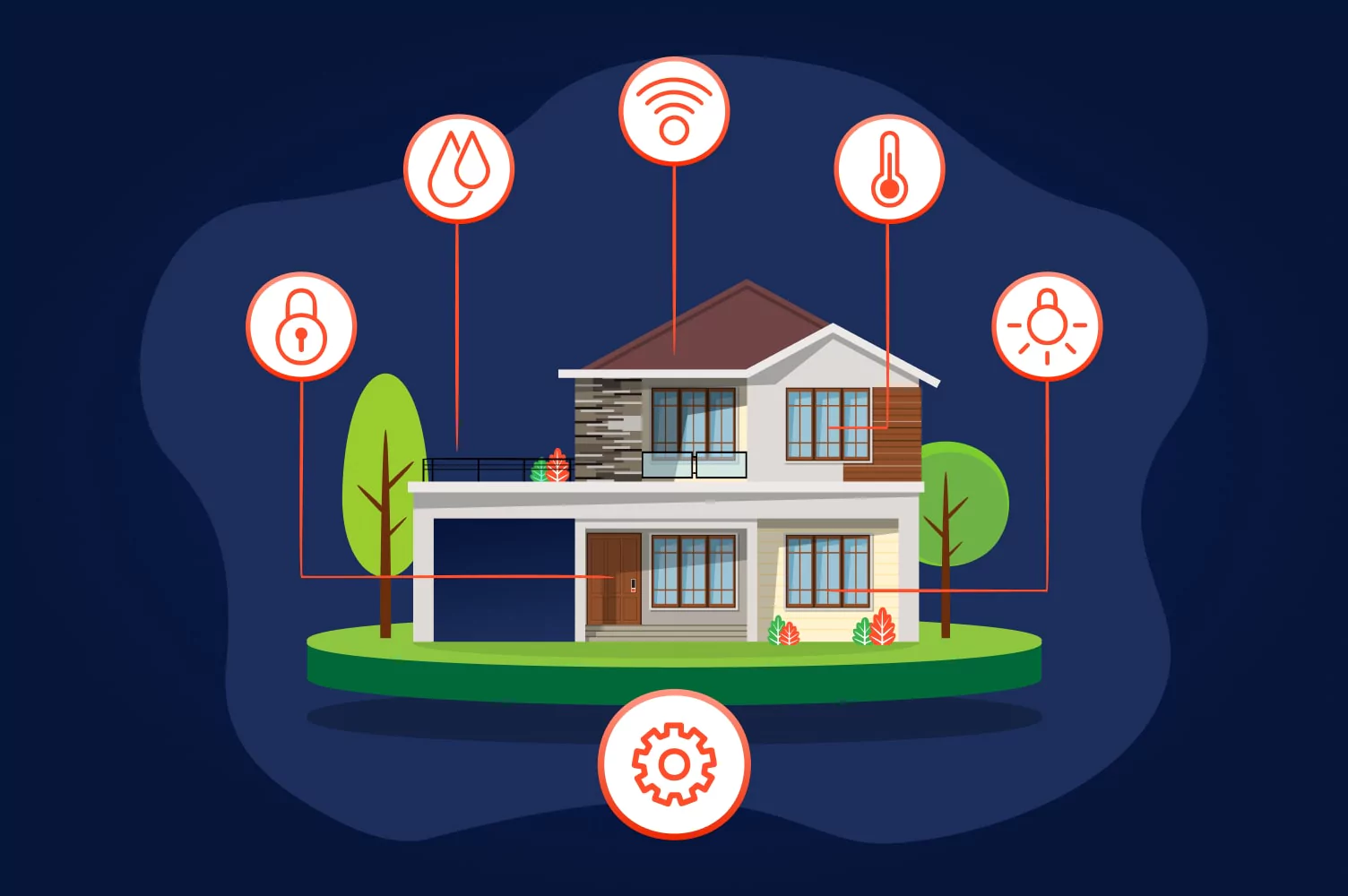Real estate is the industry that conventionally lags behind technology adoption. However, artificial intelligence (AI) and real estate business seem to be made for each other. Global market size of AI in real estate is going to grow up to $737 billion in 2027, while the overall AI spending will be $97.9 billion by 2023 that is 2.5 times more than in 2019.
No doubt, the future of real estate business depends on AI solutions. Artificial intelligence delivers many benefits for property businesses such as improved property search at listing websites, accurate property pricing, advanced construction project planning, and even smart workplace management.
As a result, almost 49% of real estate business owners confirm that adoption of AI helps to cut their operating costs. At the same time, 63% of property companies report that implementation of an artificial intelligence solution resulted in the revenue increase.
Such promising numbers can easily make you feel hungry for adopting AI yourself. But before doing that, you need to know exactly what possibilities AI can bring to your real estate company.
In this article, we’ll discuss the most prominent use cases of AI in the real estate industry. JatApp has 6 years of experience in developing custom software for real estate companies, so we’re always searching for cutting-edge technologies to give our customers as many competitive advantages as possible.
What does AI mean in the real estate business?
The term ‘artificial intelligence’ does sound cool, but what’s really behind these two words? Artificial intelligence is a digital technology that combines large amounts of data for processing with intelligent algorithms, thereby enabling the software to detect logical patterns which can be used for various purposes. Artificial intelligence doesn’t necessarily imitate the human mind. In fact, AI significantly outperforms human thinking.
In the real estate business, AI is used for many reasons. Finding a customer a relevant home for buying or mortgage is one of the common examples. Smart algorithms search through a myriad of data inputs such as property price, location, crime rate in the area, debt history and such to find a perfect home for a customer in the blink of an eye.
The use of AI in the real estate industry is obviously not limited to the above mentioned example. That’s why we’d like to share some other cases with you.
How is AI used in real estate?
As we said, the future of real estate technology is getting much brighter thanks to artificial intelligence, so this domain keeps developing every single day. There are many examples of how property companies use artificial intelligence to become more competitive and cost-effective. So, let’s have a look at the most popular AI applications in real estate.
Property search
In the age of the Internet, navigating through a housing market by using so-called multiple listing services (MLS) has become a no-brainer. Homebuyers are able to select a property for purchase by setting their preferences for locations, square footage, price, and building design. But even these specifications don’t give customers quick answers, so they have to spend much time looking for a home that meets all expectations.
Zillow found a way that makes home search fast and convenient. Using AI algorithms, the company collects and processes all customer preferences to show only those houses that truly meet a client’s requirements. Since the intelligent system of recommendations shows only the most appropriate sale offers, customers can quickly find the right property for purchase.

Lead generation
While searching for a perfect apartment is the main pain point for homebuyers, reaching out to relevant groups of customers is the burden of real estate agents. First of all, an agent needs to single out clients that are ready to buy a home. Many visitors of MLS websites just do an online window shopping and don’t intend to purchase a home any time soon.
Second, a realtor may be specialized in a particular category of property, so identification of customer groups according to location, willingness to pay, or property preferences is another challenge.
Compass uses the AI for real estate agents that helps a realtor to qualify leads according to custom requirements. Compass includes an AI-driven CRM that shows real estate agents whether their potential clients are active on the MLS platform or any other property search website. In such a way, realtors can track customer behaviors and plan their actions accordingly.
Compass user interface
Agent recruiting
Real estate companies always look for new growth opportunities, since the market is extremely competitive. Recruitment of professional agents, who specialize in untapped and expanding market segments, is the goal of every single property company. However, it’s hard to decide what candidates are really good, especially when emotional bias can influence the hiring decision.
Recruit is the AI for real estate companies, which creates custom search profiles based on requirements a property company has for its candidates. The solution gathers realtors’ performance data from MLS websites and sorts it according to more than 30 parameters.
Recruit assigns each candidate a Fit Score to show how well they meet a property company’s expectations. All candidates are presented in the list where top positions belong to realtors that fully match the requirements.
Recruit user interface
Transactions management
Needless to say, real estate companies intend to provide their customers with the most comfortable and trouble-free experiences, especially when it comes to paperwork and transactions. Customers worry about whether they buy/sell a house at an adequate price, their mortgage interest rate is fair enough, or any legal issues could possibly interfere with the purchasing process. With all the options available to homebuyers (choosing between government-sponsored FHA loans vs conventional, when to lock a rate, and so much more), technical issues should be the last of their concerns.
On the other hand, real estate companies have to be sure that a client can afford paying the debt when they mortgage a house, so evaluation of a customer’s financial situation is also necessary.
Click.AI is an automated underwriting service that enables real estate companies to sign 10 times more deals than their competitors. AI algorithms automate documentation filing, financial calculations, and customer cash flows evaluation to reduce time spent on completion of repetitive tasks. Also, the automation of these tasks ensures both the property company and customers that the transaction involves no errors or risks.
How Clik.ai works
Investment and marketing
It’s natural that property investors always try to maximize their returns on investment (ROI). Real estate investment means analysis of financial statements for an informed decision-making.
To make wise decisions, property investors have to be aware of risks, benefits, and financial leverage effectiveness. On top of that, the real estate market remains unstable due to the coronavirus pandemic, so property investors should be particularly careful with their financial decisions.
Evra built by GeoPhy is a solution that provides real estate valuation with an artificial intelligence approach. The software uses multiple data sources to predict a property’s price change and its capitalization rate.
In addition, the solution analyzes and compares different aspects that influence the asset’s value by showing market data trends on a dashboard. The AI-driven predictive analytics significantly help real estate investors to make more informed decisions and respond to market trends, regardless of what the future of the real estate market holds for their business.
Property asset analytics in Evra
Workspace management
Many businesses seek ways to improve their performance. A smart use of workspace is one of the examples of how companies can do that. Actually, JLL research says that 40% of office/commercial property space is underused, which means that a company seems to be wasting a lot of money when renting a larger office.
What’s more, the COVID-19 pandemic causes a need for taking safety measures like social distancing and avoidance of space overcrowding. This situation forces office managers to come up with decisions on how they can make the workspace maximally convenient and safe at the same time.
Tririga developed by IBM is the artificial intelligence solution used for effective use of office/workplace space. The software obtains data from smart sensors and WiFi hotspots to learn how a company’s employees use their workspace. All analytics are presented in simple and clear format, so office managers can significantly minimize the wastage of workspace in the office.
Space planning feature in Tririga
Tririga is also open to integrations with other applications. For instance, JatApp’s client wanted to integrate their Tririga system with a Near Miss Reporting App to promote a safety culture amongst the workers.
JatApp developed the iOS/Android application and a web-based dashboard, so the customer got an extended solution for their workspace optimization.
Near Miss Reporting App user interface
Construction project planning
While buying property is a challenge, building one is not that easy either. Construction companies are always exposed to various risks associated with property development projects.
Resources overrun, budget shortage, or even unpredictable environmental factors often disrupt construction projects and make contractors responsible for relatable outcomes. For those reasons, construction companies crave an ability to predict any project issues possible.
It’s no surprise that a solution to these problems can be provided by artificial intelligence. Doxel is an AI-powered solution that uses autonomous sensors to track the asset’s constructed elements and estimate the earned value of each component.
The software can show the entire construction site in 3D version, provide project progress data, and display how the construction will look after a particular project milestone. The solution promises to save nearly 11% of operating costs and increase construction team productivity by 38%.
3D asset planning in Doxel
Power consumption management
Today, many people feel concerned about the future of our planet, so they tend to engage in more eco-friendly lifestyles by controlling consumption of utility resources. Additionally, the lockdown restrictions force people to stay at home, so the use of electricity and other utilities increased dramatically. That is why control of power consumption is a problem for people who are particularly conscious about the environmental impact they make.
With such AI software as Gridium, saving on resource consumption becomes possible. The software uses smart meters to gather consumption data, rate variations, influence of weather change, and so on. The solution also shows data about peak consumption periods and cases of energy wastage. This enables a user to have a bird-eye view of how much energy they consume and what can be done to reduce these spendings.
Utility use monitoring in Gridium
Smart homes
Due to the COVID-19 pandemic, the property industry faces a need to care not only about an asset’s location, maintenance, and facilities but also how property helps customers manage their work-life balance. New needs emerge, once people spend more time at home because of frequent lockdowns.
Nowadays, an apartment has to be a workplace and comfortable space for living at the same time. Such challenges make real estate companies seek opportunities to offer their clients houses that can provide them with unique living experiences.
Smart home solutions as well as various Internet-of-Things (IoT) devices are the most common technologies that can meet new needs of consumers. Advancing these solutions with artificial intelligence takes smart home technology to the next level.
In general, artificial intelligence for smart homes works as an autonomous decision-maker that controls various processes performed by smart home devices. A Google Nest smart temperature controller, for instance, can provide a good example of AI home technology.
The sensor gathers information about how users regulate the heating temperature. When nobody is home, the temperature controller automatically decreases the heating to avoid resource wastage. The device turns on the heating to reach the temperature comfortable for a user as soon as they come back home.
Google Nest dashboard
It’s time to power your real estate business with AI
The future of real estate is behind artificial intelligence, so companies are massively adopting this technology. That’s why you need to implement your own AI solution fast enough to gain a competitive edge for your property business.
Nevertheless, development of an AI solution is not a one-day process, so it’s crucial that you have a team of experienced tech professionals who can create a product according to your business needs.
JatApp has worked with many real estate companies to help them automate their processes and build new products, like, for example, a property management platform. If you want to power your real estate business with AI, don’t hesitate to contact us. We’ll get in touch with you as soon as possible.













